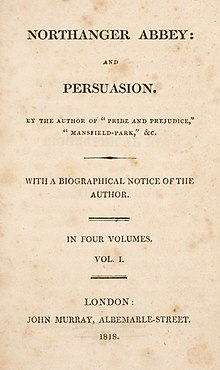LIT 4046 Romantic Literature: Jane Austen (PLNU) Dashboard
Description





Our study of Romantic Literature will focus on the writing of Jane Austen (1775-1817), whose life and work is situated Regency Period and so carries the cultural influences of both the Enlightenment and the Romantic Periods. As we closely read four of her novels, Sense and Sensibility (1811), Pride and Prejudice (1813), Mansfield Park (1814), and Persuasion (1818), , we will work to recognize and analyze the presence of major cultural issues that characterize the rise of Romanticism however overt or unacknowledged they may appear. Key issues will include the rise of democracy as expressed in Austen's consideration of women's lives and choices especially in relation to marriage and security; the laws governing inheritance and men's roles in maintenance of estates and wealth; the spectres of the lost American Colonies, the French Revolution, and military life; the struggle to abolish the slave trade and slavery in the British Empire as well the gentry's complicity in the economics of slavery, the genres of social satire, comedy of manners, and the female bildungsroman.
In tandem with our focus on the primary literary texts, we will also explore historical sources, maps, literary criticism of Austen's work, and sociological, religious, and cultural sources.
Galleries, Timelines, and Maps
There is no content in this group.
Individual Entries
Meryton is a fictional town in Jane Austen's novels. In the footnotes of Pride and Prejudice in Chapter 3, Meryton is 24 miles from London. ...
more

According to Britanica, "During the English Civil Wars two important battles occurred at Newbury: on September 20, 1643, 6,000 men fell in battle when the day was won by Parliamentary forces, and on October 27, 1644, the Royalists overcame their Parliamentary opponents and were able to relieve the local Donnington Castle" (par.1). In regards to Jane Austen's Mansfield Park, Newbury is mainly refered to as a place that characters in the novel pass through when going elsewhere; for example, Fanny and William sleep there briefly during a trip to Portsmouth (375).
...
moreCleveland Estate is located in Somerset in the same county as Mr. John Willoughby's estate, Combe Magna. Mrs. Palmer encourages Ellinor to visit by saying, "you can't think how disappointed [Mr. Palmer] would be if you don't come to Cleveland" (142). Ellinor desires to get some of her questions answered in regards to Mr. Willoughby's character. Ellinor "thought it probable that as they lived in the same county, Mrs. Palmer might be able to give some more particular account of Willoughby's general character, than could be gathered from the...
moreKellynch Hall is a fictional location in Jane Austen's Persuasion located in Gloucester (45). The estate is the family home of the Elliots and has an entail on it, making Mr. William Elliot the heir. ...
moreThis estate is where John Willoughby resides. Willoughby is also heir to his aunt, Mrs. Smith's, estate and fortune. In Chapter 14, Willloughby compares Combe to Barton cottage and admires the cottage's quirkiness, declaring it "faultless." ...
more

